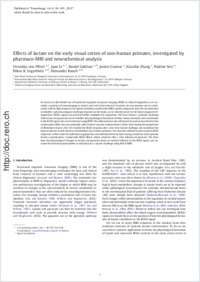Effects of lactate on the early visual cortex of non-human primates, investigated by pharmaco-MRI and neurochemical analysis
- Pföstl, Veronika von Max Planck Institute for Biological Cybernetics, Tuebingen, Germany
- Li, Juan Max Planck Institute for Biological Cybernetics, Tuebingen, Germany
- Zaldivar, Daniel Max Planck Institute for Biological Cybernetics, Tuebingen, Germany - International Max Planck Research School for Neural and Behavioral Science, Tübingen-Germany
- Goense, Jozien Max Planck Institute for Biological Cybernetics, Tuebingen, Germany
- Zhang, Xiaozhe Department of Medicine, University of Fribourg, Switzerland
- Serr, Nadine Max Planck Institute for Biological Cybernetics, Tuebingen, Germany
- Logothetis, Nikos K. Max Planck Institute for Biological Cybernetics, Tuebingen, Germany - Division of Imaging Science and Biomedical Engineering, University of Manchester, United Kingdom
- Rauch, Alexander Max Planck Institute for Biological Cybernetics, Tuebingen, Germany
-
08.03.2012
Published in:
- NeuroImage. - 2012, vol. 61, no. 1, p. 98–105
English
In contrast to the limited use of functional magnetic resonance imaging (fMRI) in clinical diagnostics, it is currently a mainstay of neuroimaging in clinical and basic brain research. However, its non-invasive use in combination with its high temporal and spatial resolution would make fMRI a perfect diagnostic tool. We are interested in whether a pharmacological challenge imposed on the brain can be reliably traced by the blood oxygen level-dependent (BOLD) signal and possibly further exploited for diagnostics. We have chosen a systemic challenge with lactate and pyruvate to test whether the physiological formation of these monocarboxylic acids contributes to the BOLD signal and can be detected using fMRI. This information is also of interest because lactate levels in the cerebrospinal fluid rise concomitantly with reduced vascular responsiveness of the brain during the progression of Alzheimer disease (AD). We studied the BOLD response after a low-dose lactate challenge and monitored the induced plasma lactate levels in anesthetized non-human primates. We observed reliable lactate-induced BOLD responses, which could be confirmed at population and individual level by their strong correlation with systemic lactate concentrations. Comparable BOLD effects where observed after a slow infusion of pyruvate. We show here that physiological changes in lactate and pyruvate levels are indeed reflected in the BOLD signal, and describe the technical prerequisites to reliably trace a lactate challenge using BOLD-fMRI.
- Faculty
- Faculté des sciences et de médecine
- Department
- Département de Médecine
- Language
-
- English
- Classification
- Biological sciences
- License
-
License undefined
- Identifiers
-
- RERO DOC 29154
- DOI 10.1016/j.neuroimage.2012.02.082
- Persistent URL
- https://folia.unifr.ch/unifr/documents/302485
Statistics
Document views: 120
File downloads:
- pdf: 265
